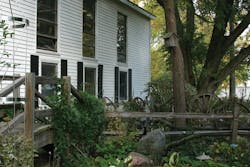There’s no uncertainty or fuzzy edges around the concept of fixing auto bodies: You pull them straight, make them align, shine and get ’em back on the road. That’s what your customers want, right? Of course. But what else do they want? And aside from probably having been involved in an accident, how do they like coming to your shop?
There’s an intangible or two involved when you talk about your customers’ reactions when they see your business, viewing it either from the street or from the front doorway before they step inside.
As a concept, aesthetics has been related to art and philosophy, with its countless rules and applications debated by many learned folks. But when it comes right down to it, aesthetics are simply about how something makes you feel, from a slimy bug to a cozy restaurant to a complex mathematical theory or a colorful painting—or the dirty body shop on the corner versus the clean-looking one across town.
If aesthetics are involved in a decision between two shops, which shop do you suppose a potential customer might prefer? Which one would you prefer?
It used to be that body shop owners didn’t have to care whether customers had a comfortable chair in a clean-smelling lobby—as far as the bodymen were concerned, the customers’ needs were relegated to the crushed metal of their cars, end of story. But the one-two combination of tight margins and tough competition is creating the knockout punch for some autobody shops, whose owners won’t be able to keep up in the increasingly high-tech, high-demand arena. Survival today is about more than restoring a vehicle to pre-loss condition.
And for those who’ve been in the ring for some time, a little light sparring has helped bring some of these factors into focus, including the importance of their businesses’ aesthetic appeal.
A NATURAL DRAW
For Bob Long, creating a business with an aesthetic component came without really giving it a second thought: A nearby homeowner in the residential neighborhood where Long opened his shop in 1971 was opposed to having a “junky old body shop” next door.
“I wanted to prove to him that it wasn’t going to be a junky body shop, so I started growing flowers around it,” says Long, the semi-retired operator of Bob’s Painting & Repair in the small, rural town of Colo, Iowa. “After I started growing the flowers, we became friends.”
Long tends to one of the main gardens around his shop while his wife tends to a second garden bed. While she goes to work at a Loew’s store early each morning, Long says, “Instead of being a wimp and staying in bed, well, I get out and do a lot of gardening before I have to go to work.”
Tending to the gardens is no small chore, considering that the Longs try to keep something blooming throughout the season; in early October, for example, he reports wild asters and mums in bloom. He’s also counting the days until the ponds on his business lot are drained and emptied, as well. Every year, the Longs round up the 50 or so fish left slipping around the muddy bottoms, keeping them for the winter in a stock tank in the basement, where he continues to feed them once a day while they wait for spring and a return to the ponds.
Long’s natural amiability and business sense told him that aesthetics were important, but the painter/upholsterer has an artistic side that’s a contributor, as well. Not one for idle moments, Long enjoys creating things in his spare time: A couple of 7-foot-tall trees, crafted out of Bondo after the image of the talking trees in “The Wizard of Oz,” add interest to the gardens and for his customers, as well.
BY DESIGN
Henry and Alma Gonzalez got into the body shop business a little more than a year ago, when the perfect property for them became available at an ideal time in their lives, Henry Gonzalez says. Now 65, Henry started in the auto industry as a young man, first as a painter’s helper, then as a painter, and on to being an estimator and finally a shop foreman.
Additionally, he and Alma spent 15 years in the insurance industry as adjusters, he adds. “This is all we’ve ever done, [work] in the autobody industry.” Toward the end of his career, the chance came up to open a new business in Bakersfield, Calif., where it’s the only body shop on its side of town. The couple was compelled to grab it.
“I thought that this would culminate all the experiences I’ve had in the body shop industry,” he says. And it has: Service 1st Collision Center runs like a well-oiled machine, without the greasy mess. It’s quite on the contrary, in fact. Their shop is clean and bright; the waiting areas comfortable and attractive. The Gonzalez’s careful attention to aesthetics does not go unnoticed by customers and visiting insurance adjusters.
“They have the idea that a body shop is a greasy, dirty place, and they come in here and it’s like going to the doctor’s office or the dentist office,” Gonzalez says. This is by design and borne of the experiences he’s had throughout his automotive career.
“As an adjuster, I’ve been to places where there wasn’t even a parking place,” Gonzalez recalls. “They were hole-in-the-wall shops that were just a business there to make money. A lot of shops were ‘underground’ and didn’t have a federal I.D. number.”
These illegally operating shops not only give the industry a dirty stain, but they continue to be a problem, he adds, because they drive down any area labor-rate surveys and skew the real numbers.
Businesses like these provide another reason to pay attention to aesthetics—if a shop owner can’t be bothered to make his or her place of business a pleasant place to be, just what kind of automotive care should its customers expect?
